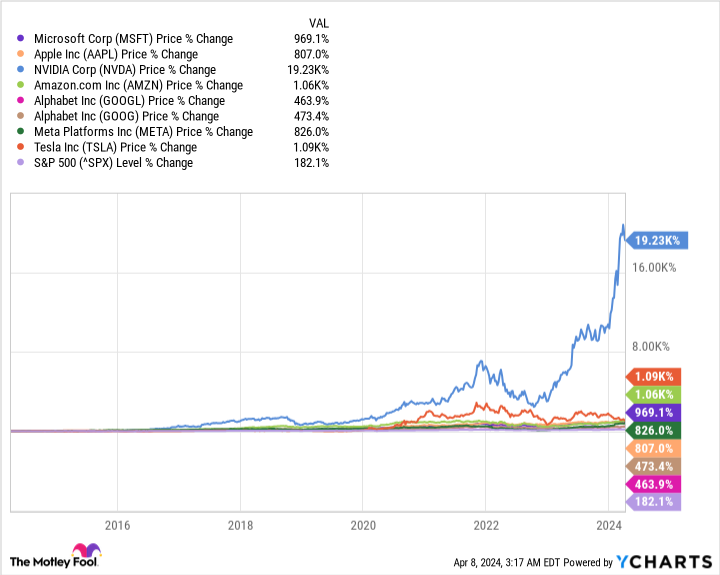[ad_1]
Although Wall Street offers few guarantees, short-term volatility is one of them. Since the curtain opened in 2020, Wall Street's three major stock indexes have traded away from bear and bull markets in consecutive years (through 2023).
When stocks are hurt by uncertainty, it is not uncommon for professional and individual investors to seek safety in industry-leading stocks, such as the companies that make up “Seven greats“.


Patient investors were attracted to the “Great Seven”
The Magnificent Seven are seven of the largest and most influential publicly traded companies. Listed in descending order of current market cap (as of April 5, 2024), these seven giants are:
There are two specific traits that have made the Magnificent Seven such a popular collectible with investors. First off, they're undeniable out-performers. Over the past decade, the standard Standard & Poor's 500 He got a percentage of 182%. Comparatively, Nvidia stock is up nearly 19,230%, Amazon and Tesla have gained more than 1,000%, and Alphabet has sparked the nightmare with a gain of “just” 464% of its Class A shares (GOOGL).
Another reason investors are flocking to the Magnificent Seven is that they all offer clearly defined competitive advantages or seemingly impenetrable moats.
-
Microsoft's cloud infrastructure service platform Azure ranks second in global market share. Meanwhile, Windows remains the clear leader in desktop operating systems.
-
Apple's iPhone has captured a 50% or more share of the domestic smartphone market since 5G-equipped versions were introduced in 2020. Apple also has the largest stock buyback program on Wall Street.
-
Nvidia graphics processing units (GPUs) are powering the artificial intelligence (AI) revolution. The company's A100 and H100 GPUs are expected to account for a 90% share of GPUs deployed in AI-accelerated data centers this year.
-
Amazon is at the top of the pack in e-commerce and cloud infrastructure services platforms. Its e-commerce marketplace oversaw nearly 38% of U.S. online retail sales in 2023, while Amazon Web Services (AWS) accounted for a 31% share of global cloud infrastructure services spending in the quarter ending in September.
-
Alphabet's Google has a virtual monopoly on global Internet search, with a 91% share in March 2024. Alphabet is also the parent company of the second most visited social network (YouTube) and the world's No. 3 cloud infrastructure services platform (Google Cloud). ).
-
Meta Platforms' social networks attracted nearly 4 billion monthly active users (MAUs) during the quarter ended December. This includes Facebook, which alone has attracted 3.07 billion monthly users.
-
Tesla is the leader in North America electric vehicle (EV) The only manufacturer and manufacturer of electric vehicles with recurring profits. Last year, Tesla produced approximately 1.85 million electric vehicles.
Billionaire investors have sold all but one “Magnificent Seven” stock
But despite the Magnificent Seven's overwhelming success, several of Wall Street's most prominent billionaire investors began pushing out those outperformers during the December quarter.
Finally, six of the seven Magnificent Seven stocks have been eliminated from billionaires' portfolios or significantly reduced, including:
-
Nvidia: Eight highly successful billionaire money managers have reduced their positions in this AI giant: Israel Englander of Millennium Management (1,689,322 shares sold), Jeff Yass of Susquehanna International (1,170,611 shares sold), and Steven Cohen of Point72 Asset Management (sold 1,088,821 shares sold) leading the way.
-
Microsoft: Seven prominent billionaires were sellers of Microsoft stock in the quarter ended December, including Ole Andreas Halvorsen of Viking Global Investors (3,024,399 shares sold) and Jim Simons of Renaissance Technologies (1,155,782 shares sold), both of whom closed out their respective fund positions.
-
the alphabet: Seven top-tier billionaire asset managers divested of Alphabet shares during the fourth quarter. Coatue Management's Philippe Lafont (3,302,342 shares sold), Lone Pine Capital's Stephen Mandel (3,113,001 shares sold), and Tiger Global Management's Chase Coleman (1,278,300 shares sold) were the top sellers, respectively.
-
Meta platforms: Six billionaires gave away Meta stock in the quarter ended December. Top sellers included Jeff Yass of Susquehanna (3,037,082 shares sold) and Chase Coleman of Tiger Global (1,430,767 shares sold).
-
apple: Four respected billionaire money managers reduced their stakes in Apple during the fourth quarter. This included Warren Buffett Berkshire Hathawaywho oversaw the sale of just over 10 million shares of Apple stock.
-
Tesla: A total of three well-known billionaire investors sold shares of electric car maker Tesla in the fourth quarter of 2023. Billionaires John Overdik and David Siegel, who co-founded Two Sigma Investments, saw their funds sell all 1,015,385 Tesla shares. Owned as of the previous quarter.
The only name missing from this list, and the only stock that billionaires are piling on, is e-commerce giant Amazon. During the fourth quarter, eight billionaires He added Amazon shares to their respective funds, including (total shares purchased in parentheses):
-
Ken Griffin of Citadel Advisors (4,321,477 shares)
-
Jim Simmons of Renaissance Technologies (4,296,466 shares)
-
Chase Coleman from Tiger Global Management (947,440 shares)
-
Ken Fisher of Fisher Asset Management (888,369 shares)
-
John Overdike and David Siegel of Two Sigma Investments (726,854 shares)
-
Steven Cohen of Point72 Asset Management (462,179 shares)
-
Israel Englander from Millennium Management (85,532 shares)


That's why billionaire investors can't stop buying Amazon stock
If you're wondering why billionaires are buying Amazon stock while scaling back or exiting their stakes in other Magnificent Seven stocks, look no further than Amazon's trio of additional, fast-growing operating segments: AWS, advertising services, and subscription services.
Although most people are familiar with Amazon because of its leading online marketplace, e-commerce has very low profit margins. The bulk of the cash flow and operating income that Amazon generates comes from the three ancillary segments.
None of these sectors is more important than AWS. Enterprise cloud spending is still relatively early, suggesting that continued double-digit sales growth should be the expectation for AWS. Although this segment represented only one-sixth of Amazon's net sales last year, it provided about two-thirds of its operating income.
Amazon's advertising operations are another source of sustainable growth. In a typical month, Amazon's website is a destination for more than 2 billion visitors, many of whom are avid shoppers. This makes Amazon one of the primary platforms that merchants want to target when getting their message(s) in front of consumers.
The third major operating division is subscription services. The last time Amazon updated the number of its global Prime subscriptions was in April 2021, when then-CEO Jeff Bezos announced that the company had surpassed 200 million. With Amazon acquiring exclusive streaming rights to Thursday Night Footballthere is a high probability that total subscriptions have increased further.
Collectively, the lure of these higher-growth sectors is to generate cash flow. During the 2000s, investors comfortably paid as much as 23 to 37 times year-end cash flow to own shares of Amazon stock. Patient investors can buy Amazon stock right now for just 13 times consensus cash flow in 2025. Even as it approaches its previous all-time high, Amazon stock is historically inexpensive.
Should you invest $1,000 in Amazon now?
Before you buy Amazon stock, consider the following:
the Motley Fool stock advisor The analyst team has just defined what they think it is Top 10 stocks Let investors buy it now…and Amazon wasn't one of them. The 10 stocks that were discounted could deliver huge returns in the coming years.
Stock advisor It provides investors with an easy-to-follow blueprint for success, including guidance on building a portfolio, regular updates from analysts, and two new stock picks each month. the Stock advisor The service has more than tripled the return of the S&P 500 since 2002*.
*Stock Advisor returns as of April 8, 2024
Susan Frey, an executive at Alphabet, is a member of The Motley Fool's board of directors. Randi Zuckerberg, former director of market development and spokeswoman for Facebook and sister of Meta Platforms CEO Mark Zuckerberg, is a member of The Motley Fool's board of directors. John Mackey, former CEO of Whole Foods Market, an Amazon subsidiary, is a member of The Motley Fool's board of directors. Sean Williams He has positions at Alphabet, Amazon, and Meta platforms. The Motley Fool has positions in and recommends Alphabet, Amazon, Apple, Berkshire Hathaway, Meta Platforms, Microsoft, Nvidia, and Tesla. The Motley Fool recommends the following options: long $395 January 2026 calls on Microsoft and short $405 January 2026 calls on Microsoft. The Motley Fool has Disclosure policy.
Learn about the 7 great stocks that billionaire investors are piling into Originally published by The Motley Fool
[ad_2]
Source


